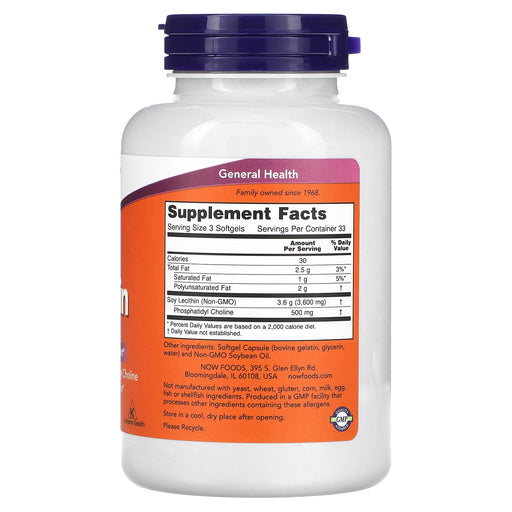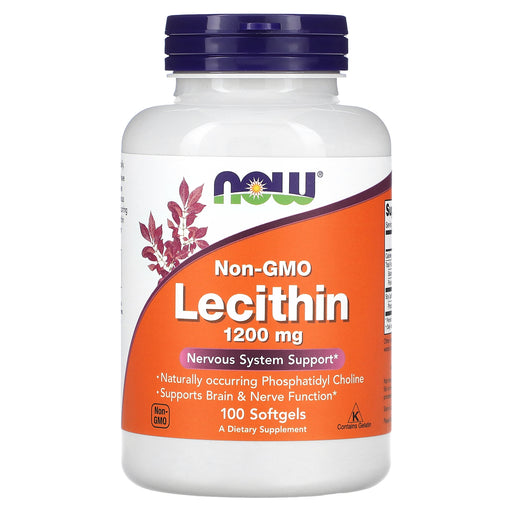
Harnessing the Power of Phosphatidylcholine for Brain Health and Beyond
Phosphatidylcholine is a vital phospholipid that plays a crucial role in maintaining the health and function of cell membranes throughout the body, particularly in the brain. As a key component of the neurotransmitter acetylcholine, phosphatidylcholine is essential for supporting cognitive function, memory, and overall brain health.
What is Phosphatidylcholine?
Phosphatidylcholine is a type of phospholipid that consists of a choline head group attached to a glycerophosphoric acid tail. It is a major component of cell membranes, particularly in the brain, where it helps maintain the structure and fluidity of neuronal membranes.
In addition to its structural role, phosphatidylcholine is also a precursor to the neurotransmitter acetylcholine, which is involved in learning, memory, and muscle function. Phosphatidylcholine supplements are often derived from soy or sunflower lecithin and are available in various forms, such as softgels, capsules, or liquid extracts.
Benefits of Phosphatidylcholine Supplements
Incorporating phosphatidylcholine supplements into your health routine may offer several potential benefits, including:
- Supporting Cognitive Function: By maintaining the health of neuronal membranes and providing a precursor to acetylcholine, phosphatidylcholine may help support cognitive function, memory, and overall brain health.
- Promoting Liver Health: Phosphatidylcholine is a key component of the liver's cell membranes and may help support liver function, detoxification, and protection against fatty liver disease.
- Supporting Digestive Health: Phosphatidylcholine is essential for the production of bile, which helps emulsify fats and facilitate their digestion and absorption.
- Maintaining Cell Membrane Integrity: As a major component of cell membranes, phosphatidylcholine helps maintain their structure, fluidity, and function throughout the body.
- Potential Cardiovascular Benefits: Some studies suggest that phosphatidylcholine may help support healthy cholesterol levels and promote cardiovascular health.
Choosing the Best Phosphatidylcholine Supplement
When selecting a phosphatidylcholine supplement, it's important to choose a high-quality product from a trusted brand. Consider the following factors:
- Source and Purity: Look for supplements derived from high-quality, non-GMO sources, such as soy or sunflower lecithin, and free from contaminants and impurities.
- Bioavailability: Choose supplements that contain highly bioavailable forms of phosphatidylcholine, such as purified phosphatidylcholine or alpha-GPC, for optimal absorption and utilization by the body.
- Potency and Dosage: Opt for supplements that provide an effective dose of phosphatidylcholine, typically ranging from 500-1,500 mg per serving, depending on your individual needs and health goals.
- Brand Reputation: Select supplements from reputable brands with a history of producing high-quality, science-backed products and a commitment to transparency and safety.
- Third-Party Testing: Look for supplements that have been third-party tested for purity, potency, and safety, ensuring you receive a high-quality product.
Maximizing the Benefits of Phosphatidylcholine Supplements
To get the most out of your phosphatidylcholine supplement, consider the following tips:
- Follow Dosage Instructions: Always adhere to the recommended dosage on the product label, and consult with your healthcare provider before starting any new supplement regimen, especially if you have pre-existing health conditions or are taking medications.
- Pair with a Balanced Diet: While phosphatidylcholine supplements can provide valuable support for brain health and beyond, they should be used in conjunction with a balanced, nutrient-dense diet rich in whole foods.
- Consider Synergistic Nutrients: Combining phosphatidylcholine with other brain-supportive nutrients, such as omega-3 fatty acids, B vitamins, and antioxidants, may provide synergistic benefits for cognitive health.
- Store Properly: Keep your phosphatidylcholine supplement in a cool, dry place, away from direct sunlight and heat, to maintain its potency and freshness.
Nurture Your Brain Health with Phosphatidylcholine
If you're looking to support cognitive function, memory, and overall brain health, phosphatidylcholine supplements may be a valuable addition to your wellness routine. By providing essential building blocks for neuronal membranes and neurotransmitter production, phosphatidylcholine can help keep your brain functioning at its best.
Experience the potential of this vital phospholipid by exploring our curated selection of high-quality phosphatidylcholine supplements. With a commitment to purity, potency, and your individual needs, Health Orchard is here to support you on your journey towards optimal brain health and well-being.
Frequently Asked Questions about Phosphatidylcholine
1. What does phosphatidylcholine supplement do?
Phosphatidylcholine supplements are believed to offer several potential benefits:
- Supporting liver health and detoxification
- Improving brain function and memory
- Enhancing fat metabolism and lipid transport
- Maintaining cell membrane integrity and fluidity
- Reducing inflammation in the body
- Supporting healthy cholesterol levels
Phosphatidylcholine is a key component of cell membranes and plays a vital role in various physiological processes, making it an important nutrient for overall health and well-being.
2. What does phosphatidylcholine do in the human body?
Phosphatidylcholine is a type of phospholipid that plays several essential roles in the human body:
- It is a major component of cell membranes, helping to maintain their structure, fluidity, and function
- It is a crucial component of bile, which aids in the digestion and absorption of fats and fat-soluble vitamins
- It is involved in the synthesis and transport of lipids, including cholesterol
- It is a precursor to acetylcholine, a neurotransmitter involved in memory, learning, and muscle function
- It helps support liver health by assisting in the detoxification process and preventing fat accumulation
3. What foods are high in phosphatidylcholine?
Phosphatidylcholine is found in several food sources, including:
- Egg yolks
- Soybeans and soy products, such as tofu and soy lecithin
- Sunflower seeds
- Chicken and beef liver
- Milk and other dairy products
- Certain legumes, such as navy beans and kidney beans
- Cruciferous vegetables, such as Brussels sprouts and cabbage
- Certain nuts, such as almonds and peanuts
Incorporating these foods into a balanced diet can help ensure an adequate intake of phosphatidylcholine.
4. Does phosphatidylcholine detox the liver?
Phosphatidylcholine is believed to support liver health and detoxification through several mechanisms:
- It is a key component of cell membranes, helping to maintain the integrity and function of liver cells
- It is involved in the production of bile, which aids in the elimination of toxins and waste products from the body
- It may help prevent the accumulation of fat in the liver, reducing the risk of fatty liver disease
- It may have antioxidant and anti-inflammatory properties, protecting the liver from oxidative stress and damage
While phosphatidylcholine can support liver health, it should not be relied upon as a sole method of liver detoxification.
5. Is phosphatidylcholine good for kidneys?
While phosphatidylcholine is primarily known for its benefits to liver health, some evidence suggests that it may also support kidney function:
- It is a component of cell membranes, helping to maintain the integrity and function of kidney cells
- It may have anti-inflammatory properties, which could help protect the kidneys from damage and disease
- It may help regulate cholesterol levels, which is important for maintaining kidney health
However, more research is needed to fully understand the potential benefits of phosphatidylcholine for kidney health, and individuals with kidney issues should consult their healthcare provider before taking supplements.
6. Who should take phosphatidylcholine?
Phosphatidylcholine supplements may be beneficial for individuals looking to support:
- Liver health and detoxification
- Brain function and memory
- Cardiovascular health and cholesterol levels
- Digestive health and fat metabolism
- Overall cell membrane integrity and function
However, it is essential to consult with a healthcare professional before starting any new supplement regimen, as phosphatidylcholine may interact with certain medications or health conditions.
7. What is the risk of phosphatidylcholine?
Phosphatidylcholine supplements are generally considered safe when taken in recommended doses. However, some potential risks and side effects may include:
- Digestive issues, such as nausea, diarrhea, or abdominal discomfort
- Headaches or dizziness
- Increased risk of bleeding, particularly in individuals taking blood-thinning medications
- Potential interactions with certain medications, such as cholinergic drugs or anti-inflammatory agents
Individuals with certain health conditions, such as high cholesterol or liver disease, should consult their healthcare provider before taking phosphatidylcholine supplements.










